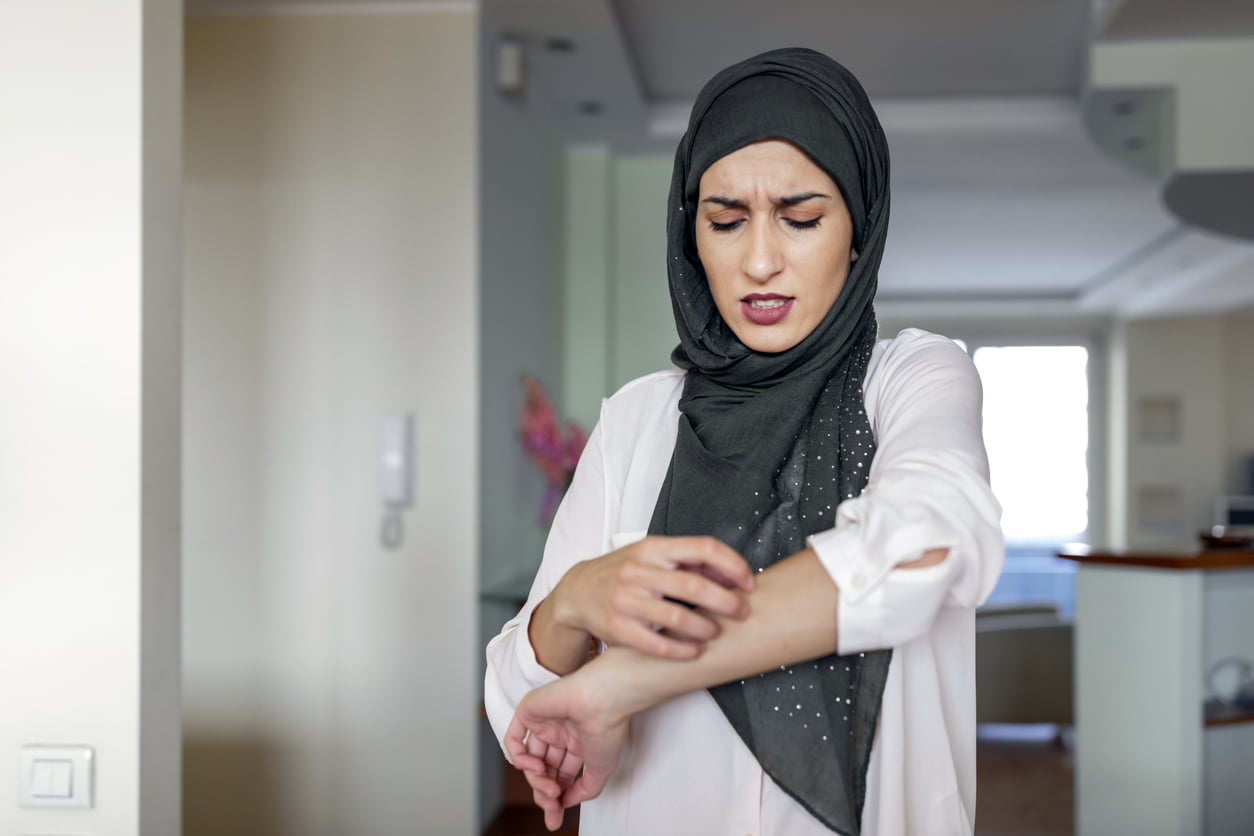
Eczema: Six Things to Know and Do
If you or a loved one is dealing with eczema, you probably know how debilitating the skin condition can be. And you’re not alone. One in three children and, it is estimated, up to three million Australians in total suffer from eczema.1
But what is it, what causes it, and what can you do about it? Here are six things you should know about eczema and six practical steps you can take to control it.
Six things you should know about eczema
1.What does eczema look like?
- The severity and appearance of eczema symptoms varies and can range from mild to severe. Symptoms include dry, itchy skin, red or brownish-grey patches, small, raised bumps that may leak fluid, and thickened, cracked, or scaly skin. There’s often a rash on the forehead, cheeks, and scalp, though eczema can appear anywhere on the body and is also common in the creases of the elbows, knees, and wrists. 2 3 4 5
2. It can be easy to confuse dry skin with eczema
- Dry skin and eczema share many of the same symptoms, which can be confusing. But it’s important to distinguish between the two, because, while they might look the same, they have different causes, and you want to be sure you get the right treatment for the right condition. You should have your Doctor or skin specialist diagnose whether it’s eczema. Many IPA Pharmacists specialise in skin care, and they’ll be happy to assist you with any questions or concerns you may have.
3. Eczema affects all ages
- Eczema often first appears in babies two to six months old. At this age, the rash can occur all over the body, which makes it particularly distressing for parents. In toddlers and young children, the rash is most commonly found in the creases, including the genital area. While children may experience frequent flare-ups, fortunately most grow out of it by the age of six, however some people suffer all their lives.3 5
4. Potential triggers for eczema flare ups
- An eczema flare-up can be triggered by things you eat, such as dairy, wheat, citrus, eggs, nuts, additives, preservatives and food colourings. Other triggers include tobacco smoke, chemicals, the weather (hot and humid, or cold and dry), and allergens, such as household dust mites, moulds, grasses, pollens, pets, clothing materials, soaps, shampoos, and washing powder.2 4
5. Can I catch eczema?
- A common misconception about eczema is that it’s contagious.4 But eczema is an immune response, not an infection, so if you don’t have it, rest assured you can’t catch eczema from someone else. While it’s not known exactly what causes some people to suffer from eczema, it does run in families with a history of the condition, or a history of asthma and allergies, like hay fever.2 3 4 5
6. There is no cure for eczema, but it can be managed
- Unfortunately, there’s no cure for eczema, and it can be a lifelong condition although it’s not life-threatening, thankfully, and the right treatment can provide effective relief from symptoms. Nevertheless, it is a chronic condition, and dealing with the itching, discomfort, and unsightly rash can take a toll on your mental health. Anxiety, depression, and sleep disturbances are quite common among people living with eczema.3 4 It’s important to get the symptoms under control as much as possible, and to address any mental health aspects as part of an overall management plan.
Six things you should do about eczema
1.Get a professional diagnosis
- If you think you have eczema, see your Doctor or a Dermatologist. They can diagnose the condition, help you understand the triggers specific to your case, and work with you to create a personalised treatment plan.3 It is recommended to do this as soon as you recognise the symptoms, as early intervention can prevent eczema from worsening. It is important to be mindful of eczema being an autoimmune disorder, so eczema flare-ups may sometimes be complicated by a secondary bacterial or viral infection that will need medical treatment.3
2. Moisturise regularly
- Keeping your skin well hydrated is crucial to control of eczema symptoms. Use a fragrance-free, therapeutic moisturiser several times a day, especially after bathing. Look for products that are specifically designed for sensitive skin or labelled as hypoallergenic. Your local IPA Pharmacist or their team will be able to advise you on the best options.2 3 5
3. Use gentle products
- It’s a good idea to switch to a therapeutic soap-free wash and shampoo, and to use a mild fragrance-free laundry detergent. Harsh chemicals can irritate your skin and trigger flare-ups. Synthetic fragrances are may also cause skin irritation. But be aware that natural or organic products that contain scent may also aggravate your skin. Your IPA Pharmacist or team member will recommend specific therapeutic alternatives which are suitable for eczema and sensitive skin.2 4
4. Avoid known triggers
- Identify and avoid your eczema triggers as much as possible. This might mean avoiding certain foods, managing stress, not having overly hot showers, and rinsing off chlorine after swimming. A good tip is to keep a diary of symptoms and possible triggers to help you pinpoint what to avoid.2 4 5
5. Adopt a Skincare Routine
- Your local IPA Pharmacist can help you develop a daily eczema-friendly skincare routine, which you should follow even when your skin seems normal. This may include using a gentle soap-free cleanser, moisturising with a therapeutic skin moisturiser, and, if recommended by your IPA Pharmacist or Doctor, may include applying a medicated cream or ointment. Consistency in your daily skincare routine is key to managing eczema and preventing flare-ups.
6. Follow these lifestyle choices
Here are a few general tips:
- Keep nails short because the urge to scratch can be irresistible, especially for children, and this can damage the skin and worsen eczema.3
- Wearing loose-fitting, breathable fabrics like cotton will reduce irritation to your skin. In particular, avoid wearing woollen fabrics which can irritate your skin.2
- Keep your home and work environments as cool and comfortable as possible as heat is a common trigger for eczema.2
We hope we’ve given you some useful insights that will help you manage your eczema symptoms. And remember, to stay informed about your condition and to get professional help, speak to your local IPA Pharmacist. They’re here to help you live as healthy and comfortable a life as possible.
Who are IPA Pharmacists?
IPA Pharmacists are part of Australia’s largest network of independent pharmacies. They offer personalised healthcare and expertise in medicines. They specialise in various health aspects, such as sleep and diabetes, and are dedicated to supporting your wellness journey. With a network of over 1,100 pharmacies and growing, an IPA pharmacy near you is ready to provide exceptional advice, services, and products to enhance your health outcomes.
References:
- Eczema: The Neglected Disease – Eczema Support Australia
- Eczema – symptoms, causes and treatment | healthdirect
- Atopic dermatitis (eczema) – Diagnosis and treatment – Mayo Clinic
- Eczema: What It Is, Symptoms, Causes, Types & Treatment (clevelandclinic.org)
- ACD A-Z of Skin – Atopic Dermatitis (dermcoll.edu.au)
Important Information
The information provided on this website is shared in good faith for general informational purposes only. It does not constitute an endorsement or recommendation of any specific treatment, product, or service, nor is it a substitute for professional advice. Always consult with qualified professionals regarding matters related to your health, wellbeing, or other personal concerns. While every effort is made to ensure the accuracy and reliability of the information, we cannot accept responsibility for any injury, loss, damage, or consequences resulting from its use.



